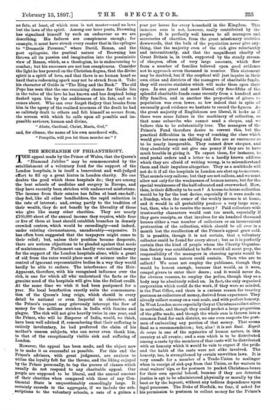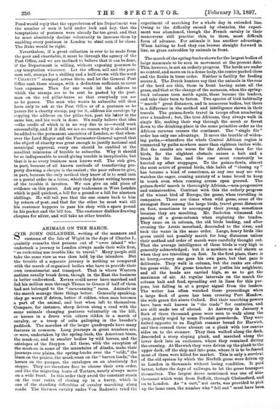THE MECHANISM OF PHILANTHROPY.
THE appeal made by the Prince of Wales, that the Queen's " Diamond Jubilee" may be commemorated by the establishment of a voluntary fund for the support of the London hospitals, is in itself a benevolent and well-judged effort to fill up a great hiatus in London charity. No one doubts the good which these hospitals do ; they are among the best schools of medicine and surgery in Europe, and they have recently been stricken with undeserved misfortune. The income from their estates has fallen at least one-half ; they feel, like all other bondholders, the rapid reduction in the rate of interest ; and, owing partly to the tradition of their wealth, they do not benefit by the liberality of those who give like many other charities. They are nearly £100,000 short of the annual income they require, while four or five of them at least should establish branches in densely crowded centres, which would be exceedingly—and indeed, under existing circumstances, unendurably—expensive. It has often been suggested that the taxpayers might come to their relief ; but, unless their position became desperate, there are serious objections to be pleaded against that mode of maintenance. Parliament can hardly vote national money for the support of the London hospitals alone, while a grant of aid from the rates would place men of science under the control of ignorant representative bodies in a way they would hardly be able to endure. The interference of the Heir- Apparent, therefore, with his recognised influence over the rich, is one for which all who understand the facts or the genuine need of the hospitals will give him the fullest credit. At the same time we wish it had been postponed for a year. No local benefaction exactly suits the commemora- tion of the Queen's long reign, which should in every detail be national or even Imperial in character, and the Prince's request may grievously intercept the flow of money for the millions stricken in India with famine and plague. The rich will not give heavily twice in one year, and the Prince, who will be Emperor of India, would, we think, have been well advised if, remembering that their suffering is entirely involuntary, he had preferred the claim of his mother's unseen subjects, who can never even thank him, to that of the exceptionally visible sick and suffering of London.
However, the appeal has been made, and the object now is to make it as successful as possible. For this end the Prince's advisers, with great judgment, are anxious to utilise the loyalty felt for the throne, and the liking enjoyed by the Prince personally, to tap the purses of classes which usually do not respond to any charitable appeal. Our people are supposed to be liberal, and the annual amount of their charities when compared with those of any Con- tinental State is unquestionably exceedingly large. It certainly exceeds in the aggregate, if we include the sub- scriptions to the voluntary schools, a rate of a guinea a
year per house for every household in the Kingdom. This immense sum is not, however, really contributed by the people. It is perfectly well known to all managers and secretaries of charities, from the great missionary societies downwards, that the bulk of the population never give any- thing, that the majority even of the rich give reluctantly and intermittently, and that the magnificent charity of Great Britain is, in truth, supported by the steady stream of cheques, often of very large amounts, which flow from a number of families believed upon good evidence not to approach seven thousand in number. This statement may be doubted, bat if the sceptical will just inquire in their own cities and districts of the managers of charitable funds, they will receive statistics which will make them open their eyes. In one great and most liberal city four-fifths of the splendid charitable funds came recently from a hundred and fifty families, and in another the proportion of givers to population was even lower, so low indeed that in spite of unusually good evidence we hesitate to record the figures. Aa the great majority of Englishmen are liberal, it looks as if there were some failure in the machinery of collection, so that none subscribe who cannot send a cheque, and we believe this to be substantially true. The managers of the Prince's Fund therefore desire to correct this, but the practical difficulties in the way of reaching the class which would give between one shilling and five are so enormous as to be nearly insuperable. They cannot draw cheques, and they absolutely will not give one penny if they are to have much trouble in giving it. To expect them, for instance, te send postal orders and a letter to a hardly known address which they are afraid of writing wrong, is to misunderstand them and their impulses altogether. They as a multitude will not do it if all the hospitals in London are shut up to-morrow. That sounds very callous; but they are not callous, and we must allow not only for the weaknesses of human nature, but for the special weaknesses of the half-educated and overworked. How, then, is their difficulty to be met ? A house-to-house collection would be by far the best device, especially if it were made on a Sunday, when the owner of the weekly income is at home, and it would in all probability produce a very large sum ; but, then, who is to receive the money ? Paid collectors with trustworthy characters would cost too much, especially if they gave receipts, as that involves for six hundred thousand houses either a vast number of collectors or an inconvenient protraction of the collection, which should be all over in a month lest the recollection of the Prince's appeal grow cold. It is possible, though it is not certain, that a voluntary collector could be found for every street ; but as it is perfectly certain that the kind of people whom the Charity Organisa- tion Society was established to baffle would all scent prey, the responsibility of the managers in choosing agents would be more than human nature could sustain. Then who are to collect ? We must not employ the publicans, though they would be honest enough, because that would, as it were, compel givers to enter their doors ; and it would never do, for obvious reasons, to employ the police, though they as a. body may be absolutely relied on. In fact, the only organised corporation which could do the work, if they were so minded, is the Post Office, and there is a curious reason for trusting postmen as collectors of money, derived from experience. They already collect money on a vast scale, and with perfect honesty. In West London more especially they at Christmas collect silver in cartloads, and though they could pocket a large proportion of the gifts made, and though the whole sum is thrown into a common fund for each district, no one even suspects the post- men of embezzling any portion of that money. That seems final as a recommendation ; but, alas ! it is not final. Esprit de corps is one of the mysteries of human nature, in this country at all events ; and a sum which is to be distributed among a caste by the members of that caste will be distributed with an honesty which it would be vain to expect if the pride and the habit of the caste were not alike involved. The honesty, too, is strengthened by certain unwritten laws. It is very unsafe for a member of a Trade-Union to malinger when in receipt of sick-pay from that Union, or for waiters to steal waiters' tips, or for postmen to pocket Christmas-boxes for their own special behoof, because if they are detected justice is apt to be administered physically or morally by the boot or by the boycott, without any tedious dependence upon legal processes. The Duke of Norfolk, we fear, if asked for his permission to postmen to collect money for the Prince's
Fund would reply that the opprobrium of his Department was the number of men it held under lock and key, that the temptations of postmen were already far too great, and that he must absolutely decline voluntarily to increase them by enabling every postman in London to steal coin if he chose. The Duke would be right.
Nevertheless, if a great collection is ever to be made from the poor and charitable, it must be through the agency of the Post Office, and we are inclined to believe that it can be done, if the Department is willing, without exposing postmen to any temptation whatever. Let the offices, sell and the post- men sell, stamps for a shilling and a half-crown with the word " CHARITY " stamped across them, and let the General Poet Office cash these stamps, with a deduction sufficient to cover bare expenses. Then for one week let the address to which the stamps are to be sent be pasted by the post- man on the red pillar-boxes so that everybody can see as he passes. The man who wants to subscribe will then have only to ask at the Post Office or of a postman as he passes for a charity stamp, pay for it, address his envelope by copying the address on the pillar-box, post his letter in the same box, and his work is done. We really believe that idea —the credit of which is in no way due to us—would work successfully, and if it did, we see no reason why it should not be added to the permanent amenities of London, so that when- ever the Lord Mayor and the Postmaster-General agreed that the object of charity was great enough to justify national and municipal approval, every one should be enabled at the smallest minimum of trouble to subscribe. Why it should be so indispensable to avoid giving trouble is inexplicable, but that it is so every business man knows well. The rich give, in part, because of all known methods of transferring pro- perty drawing a cheque is the easiest ; the poor refuse to give, in part, because the only method they know of is to send coin or a postal order in a letter, which they detest writing because of the trouble it involves. We can give an odd piece of evidence on this point. Ask any tradesman in West London which is paid quickest, a bill for a pound or a bill for nineteen shillings. He will tell you that the one comes back to him by return of poet, and that for the other he must wait till his customer happens to pass his shop with a spare pound in his pocket and the bill too. The customer dislikes drawing cheques for silver, and will take no other trouble.



































 Previous page
Previous page